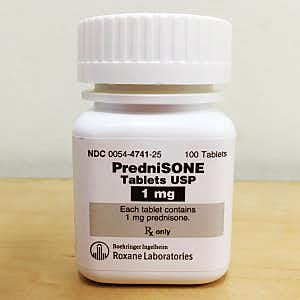
Overview
Prednisone is available both by generic name and under several brand names. It is a corticosteroid, or hormone-like medication prescribed for a wide variety of conditions.
Other cortisone-like medicines that are similar to prednisone include prednisolone or Delta-Cortef, cortisone or Cortone, hydrocortisone or Cortef, and triamcinolone, also prescribed as Aristocort or Kenacort. Much of the information on prednisone is also applicable to these other medications.
It is quite effective in short-term treatment for flare-ups of rheumatoid arthritis, bursitis, gout and other rheumatic conditions; for short-term or long-term treatment of conditions like lupus (SLE) or polymyositis; for a number of severe skin problems; to control incapacitating allergic reactions from hay fever and asthma to poison ivy or drug reactions; and for many eye disorders.
It is also indicated in certain cancers, blood diseases, respiratory diseases, multiple sclerosis, a severe kidney problem (nephrotic syndrome), some endocrine disorders and to tide a patient over a critical episode of ulcerative colitis or regional enteritis.
Side Effects and Interactions
At high doses, prednisone can lead to salt and water retention which may raise blood pressure. Blood pressure should be monitored. Susceptible people may experience low potassium or congestive heart failure.
It may also cause muscle weakness, weakened bones, peptic ulcer, inflamed pancreas or esophagus, menstrual irregularities and hormonal imbalances, including reduced ability to handle carbohydrates (insulin problems).
Rash and itching may be a sign of allergy to prednisone. The skin may also become thin and fragile, with slower wound healing, redness and increased sweating.
Side effects involving the nervous system may include mood swings, personality changes, insomnia, euphoria and depression. Headache, dizziness and convulsions have also been reported.
Children who must take prednisone should be measured on a regular basis to make sure their growth is not affected.
Report any symptoms to your physician promptly.
If you are taking any other medicines, check with a physician or pharmacist.
Barbiturates, birth control pills, blood thinners like Coumadin, estrogen replacement therapy like Premarin, seizure medicine such as Dilantin or Peganone and the tuberculosis treatment rifampin can all interact seriously with prednisone. Even over-the-counter drugs like aspirin or Pepto-Bismol may be affected.
Read more information & testimonials on Prednisone side effects.
Special Precautions
Prednisone should not be taken when there is a systemic fungal infection. Prednisone may reduce the body’s resistance to infection and mask the signs of a new infection, including certain laboratory tests for infection.
Long-term use of prednisone may increase the risk of developing cataracts or glaucoma. Regular eye check-ups are advisable. In addition, prednisone, like other corticosteroids, increases calcium loss and long-term use may result in weakened bones.
Taking the Medicine
The lowest effective dose should be used. Because dosage regimens vary depending on what condition is being treated, be sure you understand exactly how many pills you should take and when you should take them. For some conditions, early morning (before 8 a.m.) is preferable. The doctor may prescribe prednisone to be taken every other day rather than every day.
Stopping prednisone abruptly may result in symptoms of inadequate adrenal gland function. To avoid this, you may be instructed to taper off prednisone gradually. This is important, as it may take months for the adrenal gland to return to normal if it is suppressed.

